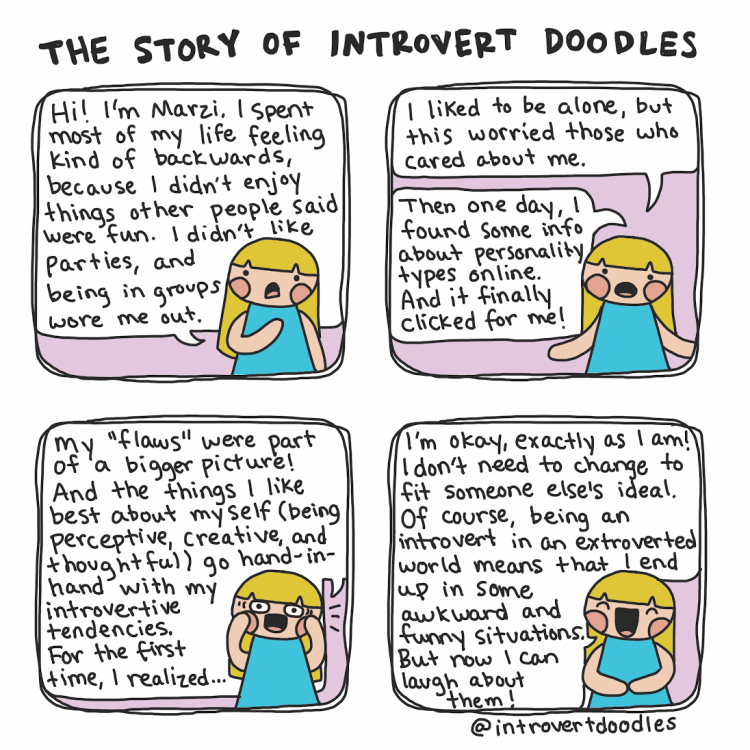From introvert to extrovert
How to Become More Extroverted
Nobody’s 100% introverted or extroverted. We all have tendencies of both personality types lurking inside us. While there are plenty of upsides to being an introvert, sometimes you need to embrace your inner extrovert, especially in the business world. Becoming more of an extrovert can help you better engage current and potential customers. It can also help you foster stronger relationships with employees and improve company communication.
How do you become an extrovert?
Although there are no exact steps to take to become an extrovert, here are tips on how to do it easier, faster and more naturally.
1. Get a home-field advantage.
Introverts are usually most comfortable in their own surroundings. If you can swing it, host personal and professional events on your home turf as often as possible, whether that’s a farewell dinner at your favorite restaurant, a home-cooked meal at your house for a date or a company happy hour at your go-to lounge.
This will help you begin to associate other people with those surroundings, and it gives you a safe space to practice talking with others, listening to group conversations and learning about others’ interests. Every gathering is practice that will help you become more comfortable conversing with others, allowing you to learn how to better communicate with people. The best place to do that, especially in the beginning, is where you feel most secure.
2. Set specific goals.
Rather than making a vague goal of becoming more extroverted or outgoing, create specific goals that can lead you to become more extroverted. These may be smaller goals at first, and that’s okay. A goal may be complimenting someone on a project, responding to a colleague with more than one word or making lunch plans with a new co-worker each week. Tackling these small goals that take you out of your comfort zone can get you closer to reaching your overarching goal of becoming more extroverted.
Did you know? The more you work your way through these goals, the more practice you’re getting.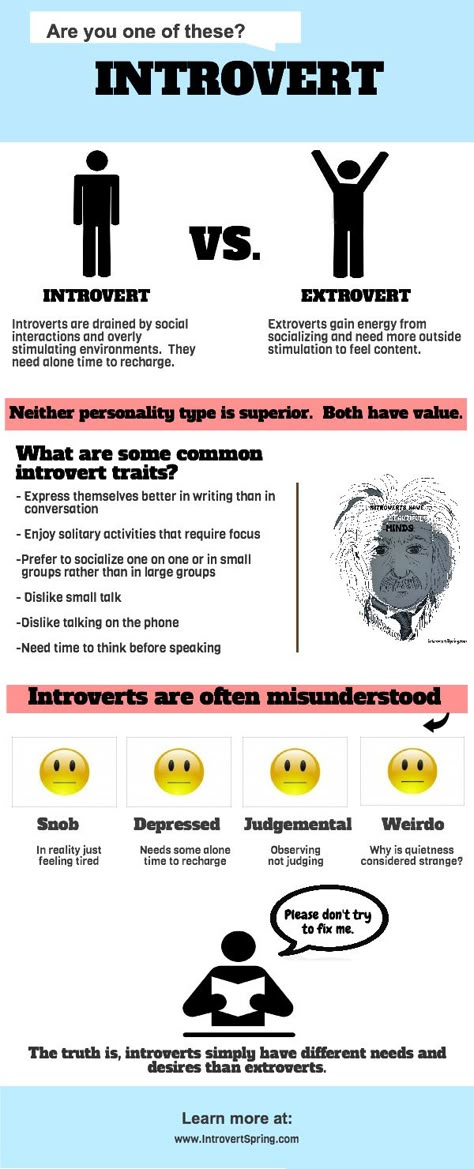 With practice, you make progress! Check out the best tools for setting and tracking goals.
With practice, you make progress! Check out the best tools for setting and tracking goals.
3. Practice, practice, practice.
Every day, you should aim to have a conversation with someone outside of your usual social or workplace circle. Ask the person, “How are you doing today?” Continue the exchange with a quick follow-up, like “What did you think of (current news or topic)?” Then embark on an engaging conversation. Try as much as possible to listen to the person and respond accordingly.
Conversations can be tricky to navigate sometimes, so it’s important to practice with different people and topics. If someone starts a conversation with you, allow it to continue by asking a question or even throwing out a compliment. Spontaneous conversations can sometimes lead to forming a bond down the line. The more you become accustomed to this, the more likely you’ll be able to do it in networking situations when it’s really needed.
Force yourself to have a brief conversation with someone at least once a day, such as the barista at your favorite coffee shop or your bank teller. The more you do what’s not natural, the more comfortable you’ll get.
The more you do what’s not natural, the more comfortable you’ll get.
4. Allow recharge time.
Many introverts will agree that while they like (some) people, they also need time to recharge. If you have something coming up where you need to be an extrovert, allow for downtime before and after. That may mean reducing your social interaction in one area of your life in order to increase it in another.
For example, before a big meeting or a situation where you know you will have to be extroverted, take a short nap or engage in a calming activity, like meditation or journaling. This can calm your thoughts and help you focus on something else for a little bit. It also allows your body and mind to have a full charge, which many introverts need when going into an extremely extroverted situation. Then, following the event, give yourself time to decompress. That could involve practicing yoga, taking a bath, reading a book or even going to bed early.
Tip: Allow for downtime to give yourself an opportunity to recharge. That’s an important form of self-care, which is also critical for supporting the mental health of your employees.
That’s an important form of self-care, which is also critical for supporting the mental health of your employees.
5. Join Toastmasters or another speaking group.
Is public speaking your biggest challenge? Join a formal group, such as Toastmasters International, where you’ll have a supportive network and opportunities to overcome this hurdle. Besides working on your speaking skills, joining an organization like this is a great way to network and make new friends.
With Toastmasters or similar groups, you will be asked to stand up and speak regularly. This will help you become a better speaker in front of people and improve your ability to think clearly while in public situations. The more you get up and speak in front of others, the more comfortable you will become with it.
“In the business world, there will be numerous occasions where you have to publically speak,” said John Rampton, a public speaking expert. “The more you’re used to this, the better it will be for you and your business.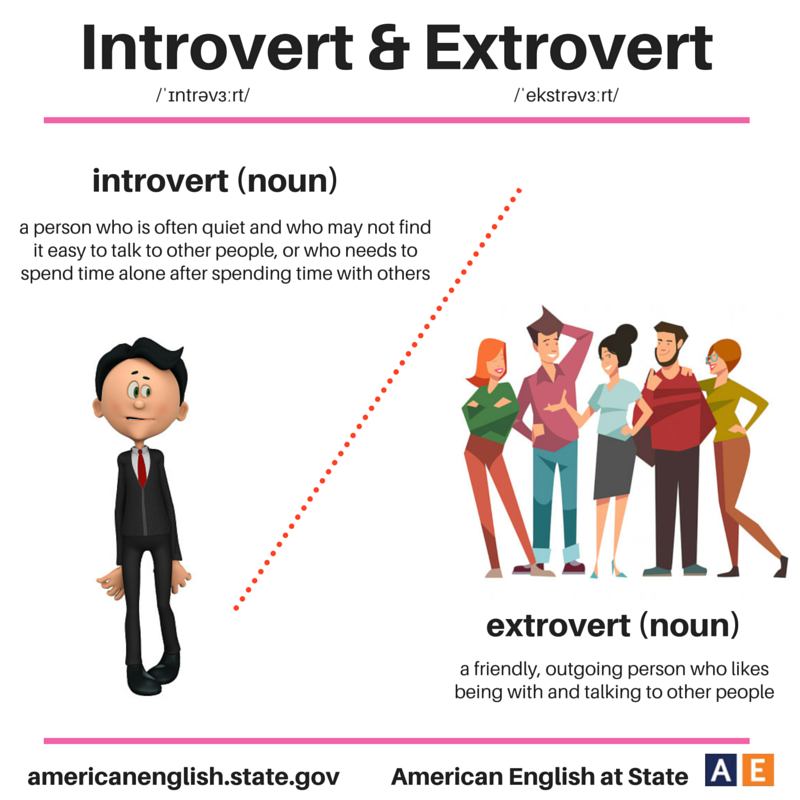 For me, this has proved very valuable over the years, as I’ve gone from speaking at one event a year to five or six events a month.”
For me, this has proved very valuable over the years, as I’ve gone from speaking at one event a year to five or six events a month.”
6. Practice saying yes.
Challenge yourself to say yes to any and all invites for a set period (a month is a good starting point). By forcing yourself into new situations, you’ll be given plenty of opportunities to develop extroverted tendencies.
Often, introverts decline invites to social events due to feeling drained, overwhelmed or nervous talking with a group of people. But saying yes to invitations or attending events you might normally turn down can increase your social exposure and allow you to practice conversational skills. Clients find business owners more trustworthy when they are willing to engage deeper, but you can’t engage if you don’t accept opportunities to socialize.
It isn’t always beneficial to say yes to everything, of course, as a packed schedule can cause burnout, but being more open to regular interaction with others will help your business grow.
7. Give yourself an out.
Does the thought of attending the holiday office party put you in panic mode? Allow yourself an out, such as committing to staying at an event for at least 45 minutes. Just going in with a specific expectation can change your mindset. You might even find that you’d like to stay longer.
This applies to business operations as well. If you have a meeting with a large group of people you’re presenting to, schedule the meeting for 15 to 30 minutes. Setting a specific time frame focuses your brain on being social and outgoing for that period, and anything over that time is simply a bonus accomplishment. It also helps you track how long you will be extroverted on a given day.
8. Use liquid courage wisely.
If you like to have a drink from time to time, especially in social situations, don’t get too dependent on liquid courage – but know that it’s a resource you can use if it works for you. One or two drinks (max) can help in stressful situations, but it should never be your first resort. If nothing else seems to be helping, a cocktail may make you relax in a group setting.
If nothing else seems to be helping, a cocktail may make you relax in a group setting.
9. Know where to stand.
In a networking or party environment, do you hug the walls or head straight to the refreshment station and stay there? Think of the extroverts you know: You probably won’t spot any of them stationary or hanging back against walls. Instead, they typically stand in the middle of the room and are open to conversations with the people around them.
When standing in front of someone, look them in the eyes and position yourself a few feet away. Try to stand directly in front of the person you’re talking to. This will help you develop a personal relationship with them without invading their space or increasing your anxiety due to your proximity.
10. Pretend you’re playing host.
At a wedding, the newly betrothed are committed to visiting every table, connecting with every person and not staying next to the people they know best. Pretend you’re hosting every event you attend, and talk to as many guests as possible. You should do this in business situations, networking events and even family gatherings. After all, practice leads to progress.
You should do this in business situations, networking events and even family gatherings. After all, practice leads to progress.
11. Practice active listening.
The most fascinating people are usually the best listeners, and this is where introverts can excel, as they are often gifted listeners. Ask questions, give follow-ups and show genuine interest in what others are saying. You’re unlikely to build a strong sales team, close sales or win customers over the phone without being good at verbal and nonverbal communication.
12. Brush up on current events.
If you’re heading to an event, do a quick scan of the top news stories of the day. This will ensure you are up to date on current events and have something to bring up in conversation. You also want to appear informed if someone mentions a hot topic to you.
13. Pinpoint the icebreakers in the room.
Whether it’s a person’s interesting jewelry or the most eclectic item in a silent auction, identify a few things that are icebreakers and use them to your advantage. For example, when you’re with a potential business partner, you might decide to make icebreaker comments on things they are wearing or carrying, like a purse or briefcase. This can help eliminate the stress that most introverts feel when going into a situation that requires them to be more extroverted.
For example, when you’re with a potential business partner, you might decide to make icebreaker comments on things they are wearing or carrying, like a purse or briefcase. This can help eliminate the stress that most introverts feel when going into a situation that requires them to be more extroverted.
14. Stay off your phone.
This can be a huge challenge for introverts and extroverts alike, as business owners often have notifications and messages coming in constantly. A phone can also become a security blanket in a detrimental way if it gives you an out from having a conversation with someone or an excuse for not responding. People probably won’t want to talk to you if you look busy. This is unprofessional and can make the other person feel unheard and frustrated. If possible, leave your phone in your bag or in your car to avoid the temptation of using it as a crutch in environments where you should be focused on engaging with others.
15. Have a few anecdotes at your fingertips.

Whenever you are expected to engage with people, have appropriate jokes and anecdotes at the ready. If you’re attending an industry event, look up a few related fun facts or recent news stories that attendees will find interesting. These are great icebreakers and will help you relax during a potentially stressful situation.
It’s not easy to shift your mindset and natural tendency to avoid engaging with others, but it’s doable. The more you put these tips to use, the better it will be for your leadership and business.
What is an extrovert?
That said, for any of these tips to work for you, you need a firm understanding of what an extrovert actually is. While introverts are more on the quiet side and tend to keep to themselves, extroverts are more outgoing and expressive in their behavior and interactions with others. Carl Jung, the famous psychologist, described these two personality groups as having different sources of energy.
Extroverts, Jung argued, get their energy by interacting with others and the world around them. They are most comfortable working in groups, exploring their thoughts and ideas aloud, and problem-solving with others. Extroverts are more likely to be spontaneous, leading to risk-taking behavior. Their spontaneity also contributes to their flexibility and adaptation to new situations or circumstances. It’s easy to see why these skills, as they relate to communication and confidence, are valuable when running a business. They are qualities to look for not only in yourself, but also in managers and other high-level employees who help lead your company. [Learn more about identifying leadership skills.]
They are most comfortable working in groups, exploring their thoughts and ideas aloud, and problem-solving with others. Extroverts are more likely to be spontaneous, leading to risk-taking behavior. Their spontaneity also contributes to their flexibility and adaptation to new situations or circumstances. It’s easy to see why these skills, as they relate to communication and confidence, are valuable when running a business. They are qualities to look for not only in yourself, but also in managers and other high-level employees who help lead your company. [Learn more about identifying leadership skills.]
Bottom Line: While all personality types are needed for a business to flourish, it can be vital to have extroverts in key roles. You’ll want to express extroverted behaviors yourself as a business owner, like openness, creativity and adaptability.
What are the benefits of being an extrovert in business?
Businesses thrive with both introverts and extroverts working together and using their strengths.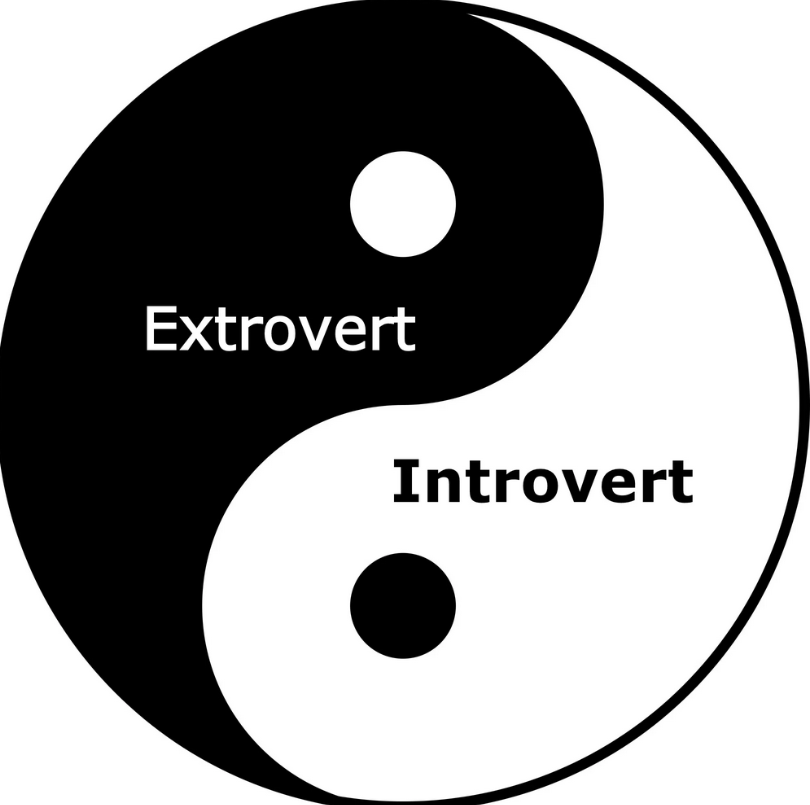 However, extroverted behavior and interaction can be more beneficial in a business, especially when working with colleagues, clients or consumers. Here are a few benefits of being an extrovert in business.
However, extroverted behavior and interaction can be more beneficial in a business, especially when working with colleagues, clients or consumers. Here are a few benefits of being an extrovert in business.
- Positive emotions: Extroverts tend to experience more positive emotions, which can help them avoid burnout. This is not to say extroverts will never experience burnout, but they are less likely due to their socialization skills, love of being around others and ability to adapt to different situations.
- Strong impressions: Co-workers or employees are likely to view extroverts as impressive, and it is easier to get others to do something for them. Extroverts are better at communicating what they want or need and delegating tasks. This is one reason extroverts take on leadership positions.
- Continued motivation: Extroverted individuals often are unafraid to speak up for themselves, advocate for their career goals and remain motivated to achieve objectives and work toward rewards.
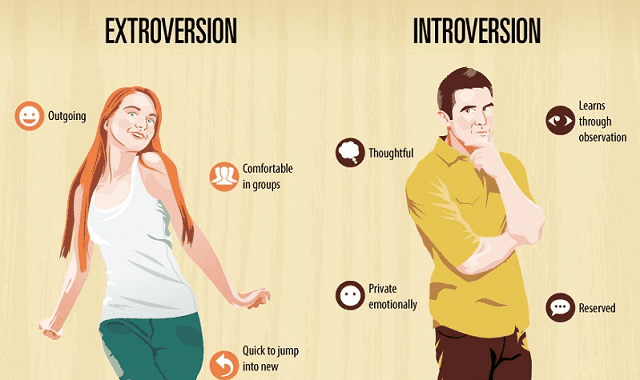
- Frequent collaboration: A business environment works best when co-workers and leaders collaborate to achieve goals. Extroverts tend to naturally enjoy collaborating with others because it allows them to discuss their ideas out loud, hear others’ suggestions and work together to create solutions.
Drew Hendricks contributed to the writing and research in this article.
Secrets for Introverts to Become More Extroverted
As an introvert, would you like to become more of an extrovert?
Do you want to enjoy activities without feeling like you have to hide in a corner?
There’s no doubt about it, socialising gets overwhelming for introverts. It can suck the life out of you and leave you with no interest in socialising regularly.
While there’s nothing wrong with being an introvert, it’s hard to get to know new people if you aren’t willing to change. And, it’s also hard to grow professionally or even ask for a promotion.
Luckily there are a few secret hacks you can try to become more of an extrovert.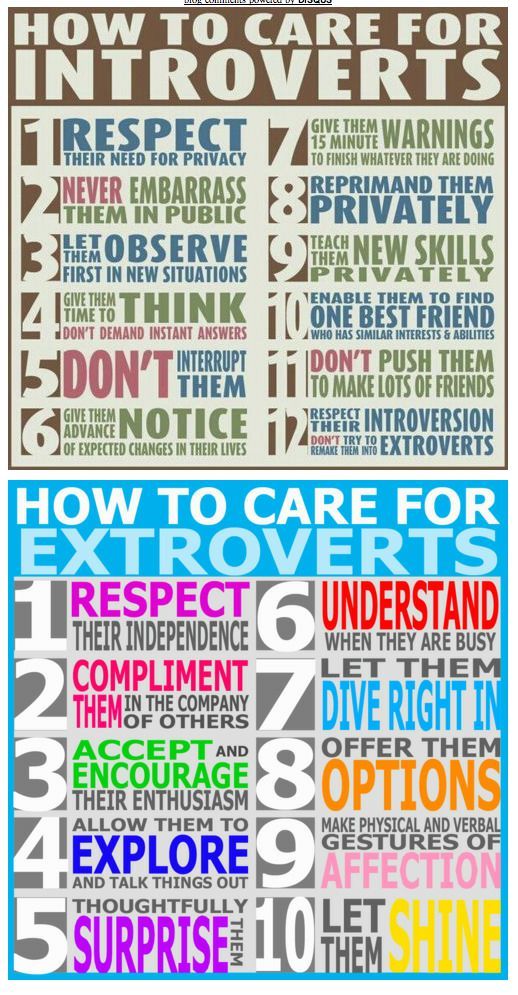 It doesn’t mean you have to like it, but who knows — after getting your feet wet — you might love it!
It doesn’t mean you have to like it, but who knows — after getting your feet wet — you might love it!
Embrace who you are, but don’t be afraid to improve yourself. It’s okay to grow and change as an individual. Here are some tips to help you do just that.
1. Fake It ‘Til You Make It
Even if you don’t see yourself becoming an extrovert, put yourself out there.
That means you should go to get-togethers with bigger groups of people. Socialising should also include attending work events once in a while.
Taking the first steps when you arrive can be uncomfortable. Instead of running away (we know you want to!), drum up the courage to meet new people.
Pretend that you love being social, and you may find yourself enjoying it!
If you start to feel overwhelmed, take baby steps. Rome wasn’t built in a day. Try again soon so you can focus on becoming more of an extrovert!
2. Practice Smiling
Smiling goes a long way for an introvert because it encourages people to approach them.
If you’re at a get-together, make eye contact. While making eye contact, be confident, and smile. Making a point to smile prompts people to make conversation.
And, professionally, this will help business associates to feel more relaxed around you. So give it a try!
Smile and people will want to get to know you because you’re doing your best to relax and enjoy yourself.
3. Make Time to Relax
Since you’re an introvert, you’re used to feeling drained after outings.
To get used to being more social, you’ll still need to make time to recharge your batteries.
Before and after socialising, get in the relaxation zone. Staying calm will help you focus when on outings instead of feeling overwhelmed.
Your relaxation time may entail reading a good book or taking a nap. Do whatever it takes to unwind. If you’re relaxing after being social, you deserve your “me time!”
4. Stare at the Mirror and Practice
Okay, we’re not suggesting you have to stare at the mirror every time and practice. But, it can certainly help you work on your confidence!
But, it can certainly help you work on your confidence!
While looking at yourself in the mirror, practice projecting your voice. And, use some non-verbals. Focusing on perfecting these skills can help you prepare ahead of time.
Hey, they say practice makes perfect! So, give your pretend audience a good show.
By the time you venture out, you’ll be an introvert who’s rapidly becoming an extrovert.
5. Create an Escape Plan
Becoming an extrovert won’t happen overnight. And since it could take a while, have an “out” planned in case it gets too overwhelming.
You can do this by coming up with a valid reason you need to leave by a set time. For example, let the host know that you have another engagement in an hour.
Having an escape plan can make you feel less stressed out. And if you’re feeling calmer, you should be able to enjoy yourself during the outing.
6. Be an Active Listener
Part of being an extrovert is caring about what others have to say.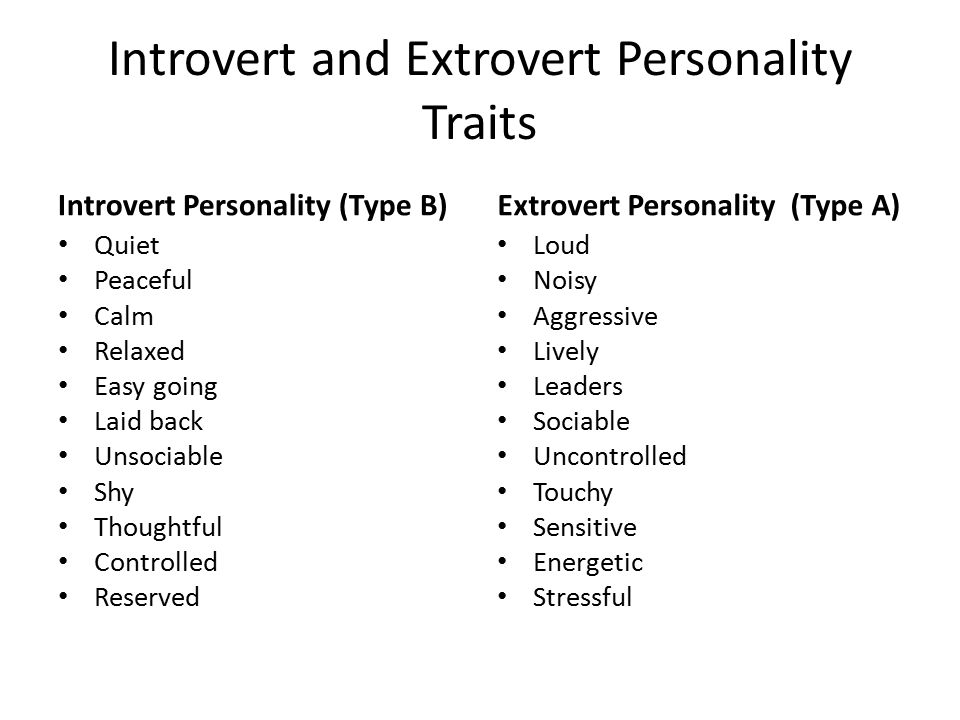
As an introvert, you're likely already good at showing interest in the conversations you have.
Use this to your advantage!
Your excellent listening skills will make people want to get to know you better. And if that happens, you're on the fast track to acquiring extroverted skills!
7. Harness Your Strengths
When you attend social events, focus on your strengths.
For example, if you know a lot about a specific topic, weave that into the conversation.
Or, better yet, go to events that center around your interest.
Taking part in a get-together that has people who have the same hobbies will make it easier to connect.
8. Join a Club
As we previously mentioned, getting to know people at an event that focuses on your hobby is a great idea. Well, it’s the same way if you join a club.
Use a club or focused event as an opportunity to improve your people skills. It'll undoubtedly help you embrace becoming more outgoing.
It's a lot easier to talk about your interest at a club. If it’s a cooking club, for example, you already know what you'll be discussing.
If it’s a cooking club, for example, you already know what you'll be discussing.
Although there's no need for you to be afraid to talk about other topics as well!
9. Put Your Phone Down
Distractions are everywhere during an event, especially on your phone! Even though you may get tempted to escape by focusing on your phone, try not to do that.
At any event, you should give people your undivided attention.
Otherwise, you'll have a harder time connecting with anyone.
Staying glued to your phone during an outing will defeat the purpose of socialising.
Remember — your goal is to become more of an extrovert!
In Conclusion
In closing, learning how to become an extrovert means stepping out of your comfort zone.
To become more outgoing, focus on ways to make that happen.
Don't develop behaviors that change the person you are. But instead, these newfound habits should help you become a better version of yourself.
Apply these secrets, and your introverted self will thank you. You’re finally on your way to becoming an extrovert!
You’re finally on your way to becoming an extrovert!
Author Bio:
Caitlin Sinclair is the Property Manager at 7403 and has been a team member since the doors opened in the community. She takes great pride in the management team, providing superior service as well as establishing and maintaining relationships between 7403 and local businesses.
Photo by Retha Ferguson from Pexels
Extroverts, introverts, ambiverts: who they are and how to work with them
The company's team consists of a large number of people with different characters. In order for an HR specialist to effectively interact with employees, understand their motivation, know which work is comfortable for them and which is not, you need to be able to determine the personality type of specialists. There are three types of personality types: extroverts, introverts and ambiverts.
In our new article, you will learn what these types of people are and how to interact with them for productive work. nine0003
nine0003
An extrovert: distinctive characteristics and secrets of interaction
Extroverts are the "lighters" of the company, which are open to the world and directed towards people. They are very sociable and easily get along with people. As a rule, extroverts quickly get used to the new team and can carry on any conversations.
Extroverts are filled with energy if there are a lot of people around them. The book Cognitive, Affective, and Behavioral Neuroscience states that there are two types of extroverts:
- Active. Their key characteristics are assertiveness, success leadership, perseverance. Active extroverts like to be the center of attention and very often occupy leadership positions.
- Affiliates. Friendly, open and sincere guys. They easily find contact with new people and value their loved ones very much, because relationships mean a lot to them.
The main characteristics of extroverts:
- love to be the center of attention;
- do not like routine and monotony, they prefer variety;
- know a lot of people and make contact with strangers easily;
- they are driven by interesting work tasks, they are happy to take on a variety of complex tasks, but only if they are interested;
- first they speak, then they think;
- prefer to talk and talk about themselves than to listen to the interlocutor and try to understand his problem.
 nine0016
nine0016
How to work with extroverts and set them tasks: 4 tips from the Hurma team
1. When setting tasks, it is very important to give them time and the opportunity to reason and ask interesting questions. Ask the extrovert for feedback on the task, let him tell you how he understood it, say deadlines and expected results.
2. Extrovert employees should be assigned to projects where they can learn something new for themselves. In addition, it is important to create a “competitive” environment for them, since it is these conditions that motivate them the most. nine0003
3. Give them the opportunity to be in the spotlight, to be someone's mentor, to lead a discussion in which they can take the initiative and take action.
4. As a rule, extroverts have adequate self-esteem and are self-confident. But despite this, it is important to praise them and celebrate their achievements.
Introvert: distinctive characteristics and secrets of interaction
An introvert is the exact opposite of an extrovert. Such people focus more on their inner world than on the outside. Introverts are not very sociable, but at the same time, very pleasant interlocutors, if you talk with them on topics that interest them. In addition, if you find an approach to them and make friends, you can learn a lot of interesting things, since these are people with a rich inner world. nine0003
Such people focus more on their inner world than on the outside. Introverts are not very sociable, but at the same time, very pleasant interlocutors, if you talk with them on topics that interest them. In addition, if you find an approach to them and make friends, you can learn a lot of interesting things, since these are people with a rich inner world. nine0003
They place the main emphasis on their own knowledge and experience, and not on the views of other people. An introvert likes to read, plan things, work more productively in a calm environment. You can recognize an introvert by the expressions: "I need to think", "I need to analyze", etc.
How to work with introverts and set them tasks: tips from the Hurma team
1.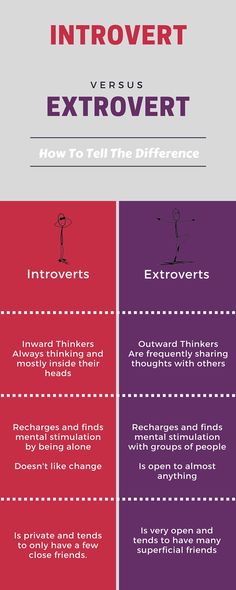 Introverts think a lot and that is why they cannot always answer the question quickly. Give them time to think things over, formulate an answer, study more information. If introverts do not know something, they study the issue, delving into the details. nine0003
Introverts think a lot and that is why they cannot always answer the question quickly. Give them time to think things over, formulate an answer, study more information. If introverts do not know something, they study the issue, delving into the details. nine0003
2. Be prepared to answer a large number of questions, because it is important for introverts to understand the manager's analytics, why the task needs to be done in this way, on what grounds this or that decision was made.
3. Introverts have one feature similar to extroverts - they also need praise and recognition of their merits. And in principle, praise is important to everyone, do not spare praise, well, really 🙂
4. When working with an introvert and setting a task, accurately calculate the time frame, explain step by step how and what needs to be done. nine0003
5. These are not the kind of people who need to be constantly monitored. If you want to work with an introvert, give him more freedom of action.
6. If you do not have time to communicate with them personally, use e-mail or corporate messengers.
Ambivert: distinctive characteristics and secrets of interaction
Ambivert is the golden mean between a calm introvert and a hyperactive extrovert. Depending on the specific situation, they can behave both as introverts and as extroverts. If they are uncomfortable, they immerse themselves in themselves; if they like the surrounding conditions, ambiverts actively communicate with everyone. nine0003
These people value both social interaction and solitude, when they can be alone and think. Barry Smith, director of the Human Psychophysiology Laboratory at the University of Maryland, claims that 68% of people are ambiverts.
The main signs of ambiverts:
- quickly join a new team and do not feel discomfort when communicating with strangers;
- have empathy, understand and listen to the emotions of other people; nine0016
- they have a wider social circle than introverts;
- they connect with people more deeply than extroverts.

How to work with ambiverts and set them tasks: tips from the Hurma team
1. Ambiverts can work with both routine and interesting tasks. Therefore, if there is monotonous work in the list of tasks, they will do it.
2. If you have difficult tasks, you can entrust their implementation to ambiverts. They are easy-going and not afraid to take risks. nine0003
3. Ambiverts are not afraid of public speaking at events, make many contacts and quickly win over. So they are the first who want to participate in various activities.
4. While working with them, remember that they, like introverts, think a lot, try to analyze all moments and aspects in order to make an informed decision.
Flexibility is key
It is important for HR managers and leaders to consider the personality types of employees in order to entrust them with projects in which they will perform at their best, and not vice versa. For example, if you want an extrovert to do a great job, don't give them a task that requires a lot of attention to detail.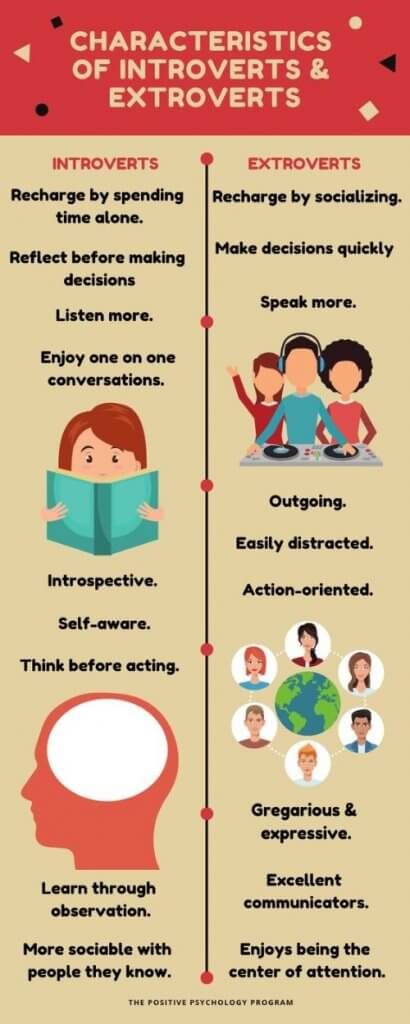 nine0003
nine0003
Encourage introverts to be active when they are active, make sure that there are not too many extroverts and they do not annoy their colleagues.
But, most importantly, remember that there are very few people who are of the extraverted or introverted type. So put in the forefront not what type you or your colleagues are, but flexibility and mutual respect.
what are personality types and how they differ, who are ambiverts
Many people think that an introvert and an extrovert are just two sides of the same coin. Will you stay at home on Friday night or meet up with friends? Will you be the center of attention or away from the spotlights? In fact, a person is not white or black, there are no pure types in psychology, experts assure. There are people, for example, very tall or short, but most strive for average values. So it is with extroversion. This is just one of the five main personality traits (openness to new things, conscientiousness, pleasantness, neuroticism), so it cannot completely determine our behavior. Let's take a closer look at what introvert and extrovert mean. nine0003
Let's take a closer look at what introvert and extrovert mean. nine0003
Vita Zorina
Tags:
Psychology
Psychology of communication
Introvert
extrovert
The famous psychiatrist Carl Jung at the beginning of the 20th century identified types of people - extroverts and introverts. In psychology, this distinction became convenient and popular, and over time began to be used to define a person in ordinary life. Knowing who you belong to, it is easier to understand yourself and choose a circle of friends. Sometimes it seems to us that the world is ruled and dominated by extroverts. Although in reality, they can simply make themselves louder, making more noise. But is the gap really that deep between an introvert and an extrovert? Do the former really need help and support in order to develop their own talents and not remain on the margins? nine0003
Everything is not as categorical as it seems at first glance.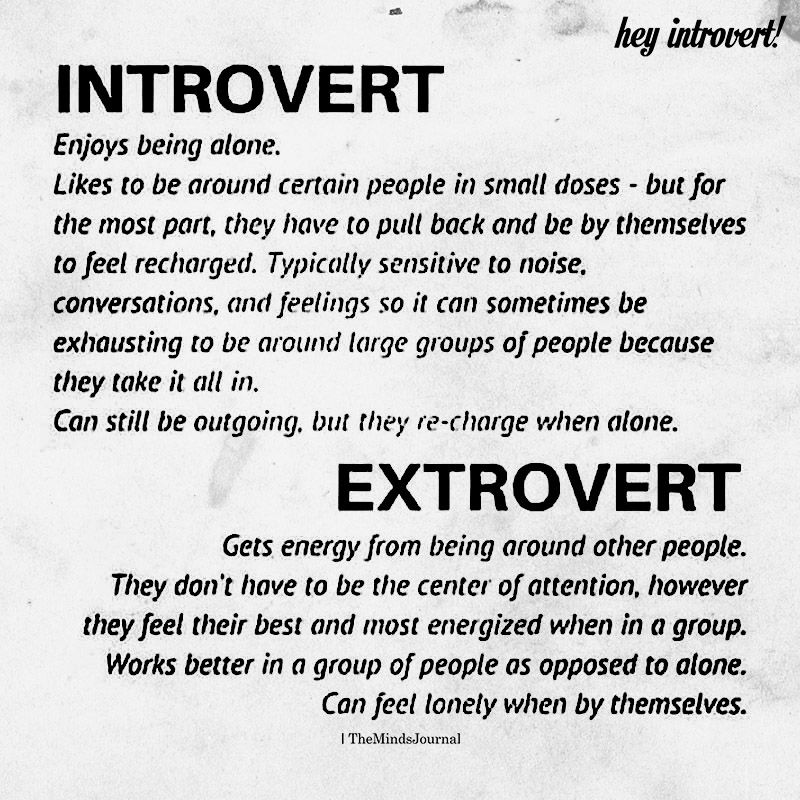 Yes, open and closed people exist. But there are many examples when an extrovert and an introvert behave in unexpected ways, because each person throughout life demonstrates flexibility and opens up from different angles. And in these categories there is a place for the golden mean. We will talk about it and the main opposites from the point of view of psychology below.
Yes, open and closed people exist. But there are many examples when an extrovert and an introvert behave in unexpected ways, because each person throughout life demonstrates flexibility and opens up from different angles. And in these categories there is a place for the golden mean. We will talk about it and the main opposites from the point of view of psychology below.
What does introverted personality type mean? The tendency to introversion is manifested if you like to spend time alone with yourself, your thoughts and ideas. If you do not know how to determine whether you are an introvert or an extrovert, try to find the following main features in yourself. They are characteristic of those who prefer to isolate themselves from the outside world more often. nine0003
- love of being alone;
- unwillingness to be the center of attention;
- one-on-one preference;
- first think, then do;
- recovery alone;
- work in a quiet independent environment;
- secrecy.
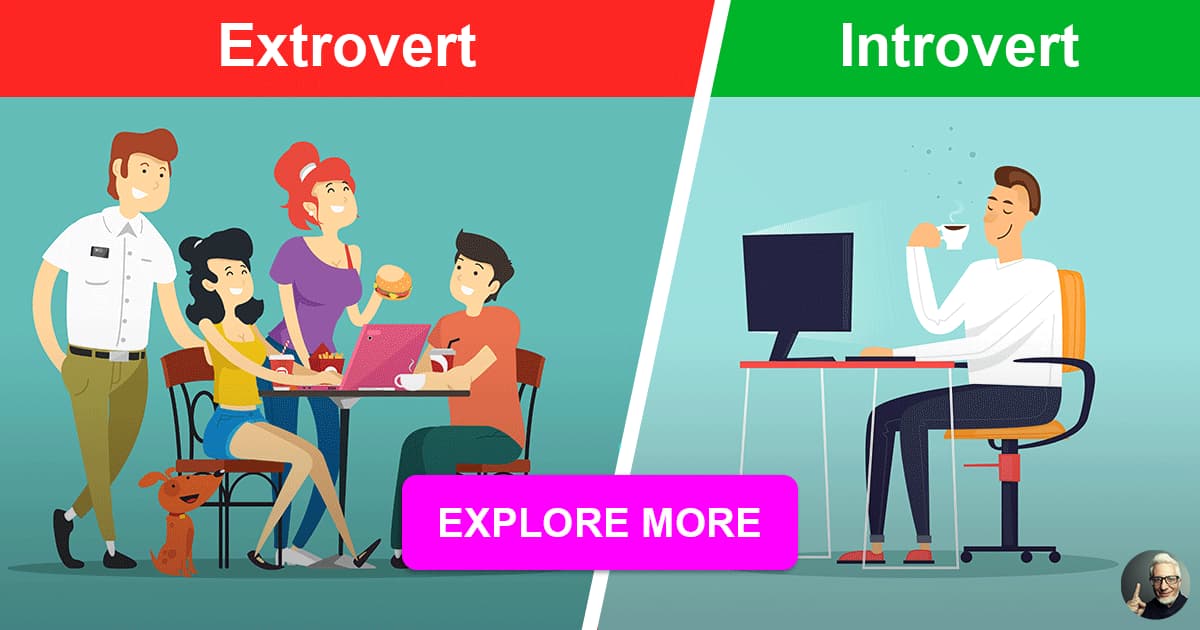
There is a big difference between introversion and shyness. Shy people are often also afraid of what others will think of them, while introverts do not have negative emotions and such fears. nine0003
Just because introverts don't like big groups doesn't mean they can't make friends and relationships. In this sense, they are almost no different from extroverts. In addition, they can make great careers simply by sticking to roles that are likely to be lonely: accounting, engineering, writing, driving trucks, etc.
The main difference between an introvert and an extrovert is the desire to focus more often on their own feelings and thoughts . They are characterized by a greater concentration than representatives of the opposite camp. It is unfair to call them socially isolated, selfish or unhappy people. nine0003
Introverts also desire to communicate, show feelings, and care for others.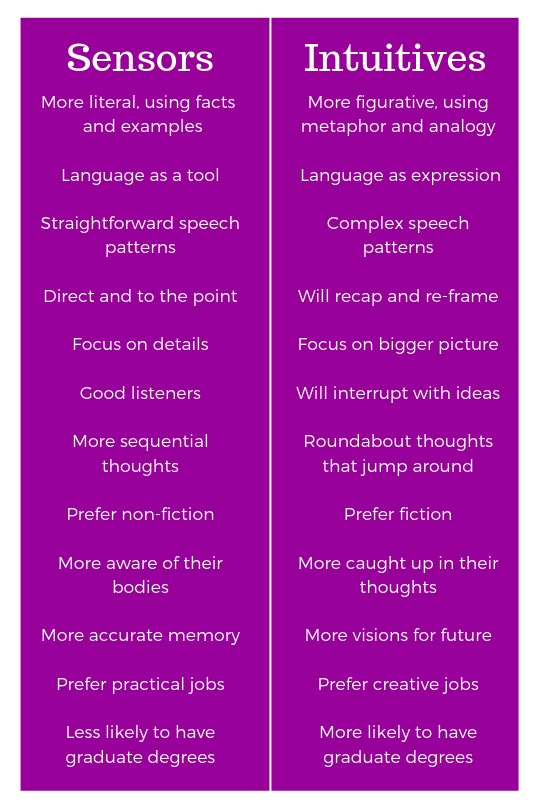 But the difference is that an introvert will do all this with more restraint, "impartiality" than an extrovert. So the talk that people who are less generous with emotions love order too much, are sensitive to negativity, or are “on their own minds” are also groundless. These are already other characteristics, from the category of neuroticism.
But the difference is that an introvert will do all this with more restraint, "impartiality" than an extrovert. So the talk that people who are less generous with emotions love order too much, are sensitive to negativity, or are “on their own minds” are also groundless. These are already other characteristics, from the category of neuroticism.
How an extraverted personality type manifests itself
Whoever is hard to blame for passivity or love of solitude is an extrovert. He just needs to draw strength from external sources. To shine and find grateful listeners in the society is about them. Hence the significant differences: an extrovert knows how to present himself, and an introvert, no matter how smart and educated, is not always capable of this. nine0003
Such people direct their energy outward — to other people and the realization of their ideas. We have looked at personality types in which an introvert manifests itself, and you can compare the main traits with an extrovert.
- many acquaintances and friends;
- love of attention;
- quick decision making;
- getting energy from being among people;
- enthusiasm and positive attitude;
- work in a team or group.
Extroverts tend to get more support from other people when they find themselves in difficult situations. And in general, there is a stereotype that society loves extroverts more, so they more often become leaders and choose sales, marketing, PR and other areas where communication with people is important. nine0003
It is important to remember that this is only one of the characteristics. And there is a big difference between a pleasant introvert and a rude extrovert.
By the way, it is often about introverts that they say that they are too sensitive people, in contrast to extroverts. The latter, they say, go through life easier and are not led to mental troubles. American psychologist and researcher Elaine Eyron has carefully studied the issue of sensitivity and came to curious conclusions. In particular, the writer noticed that Jung singled out in extroverts a love of risk, the ability to enter into a conversation without a shadow of a doubt and speak their mind. In his opinion, introverts are completely incapable of these feats. nine0003
And Elaine Ayron believes that about a third of highly sensitive people can be called extroverts. She singled out the concept of "social extrovert", which differs from Jung's introvert in that the former easily make acquaintances and feel confident in crowded places. Otherwise, they are even similar.
The definition of introvert and extrovert can help leaders and managers when working with employees. In particular, when issuing orders. It will be more difficult for an extrovert to cope with a task that requires perseverance and attention to detail. And it is desirable to encourage the initiative of introverts, not allowing extroverts to become "irritants" in the team. nine0003
Despite the fact that the extrovert and introvert have significant differences, they are able to get along in the same unit of society. You probably noticed in the company a ringleader and a “quiet woman”, in a pair a more impulsive spouse and her “obedient” husband, and so on. They find compromises and interact with the whole world, and not just representatives of their "clan".
An introvert and an extrovert at the same time: an ambivert type
As soon as a friend refrains from a verbose conversation or wants to read a book alone on the weekend, you involuntarily begin to write him down as an introvert. Labels are always easier to attach. So there is a feeling that the person was able to “bite through”, which means it will be easier to build an appropriate relationship with him. But you should know that there are not only extrovert and introvert, but also other concepts. nine0003
Introverts and extroverts view pleasure differently. Their source for this is different. For one, this is a quiet rest, and for the other, being in the center of attention. But if after a noisy party there comes a desire to sit alone, this is the golden mean. The ambivert is the bridge between the introvert and the extrovert, containing the qualities of both. Psychologists believe that it is mixed personality types that prevail. Barry Smith, professor emeritus and director of the Laboratory of Human Psychophysiology at the University of Maryland, claims that ambiverts make up 68% of the total population. nine0003
Thanks to this view, we understand that not everything is so simple in the psychological portraits of people. Ambiver is the middle between the introvert and the extrovert, it has its features:
- Flexibility in communication
- The ability to appreciate the charms of loneliness
- The desire to be published (dosed)
- ability to adapt to situation
- a good listener and an speaker
They took the best from two fronts, combining the character of an introvert and an extrovert. According to psychologists, ambiverts become worthy managers because they show leadership qualities and remain reasonable, able to stop and delve into issues. They are equally comfortable shining in society and secluded from prying eyes. nine0003
Director of the Indiana State University Shyness Research Institute Bernardo Carducci believes that the prevalence of introversion and extraversion is strongly influenced by genetics. The cross between an extrovert and an introvert - ambiversion - is also a hereditary tendency, not an acquired one.
How to know if you are an introvert, extrovert or ambivert
Most people are in the middle of the extraversion scale. This means that an introvert and an extrovert in their absolute form are extremely rare. And this is very good. Everyone has their own temperament, which reveals our emotionality to one degree or another, reflects actions. But this is only one of the puzzles of the multifaceted nature of man.
